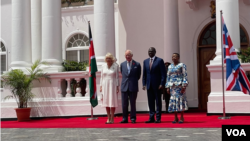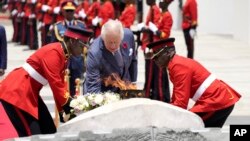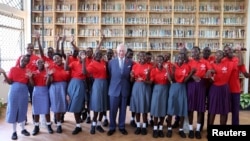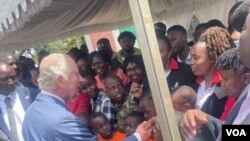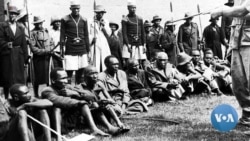Britain’s King Charles has begun a four-day visit to Kenya, his first trip to Africa since becoming king following the death of his mother, Queen Elizabeth, last year. Addressing aspects of Britain’s colonial past, issues related to the climate crisis, education and the importance of national security will top the monarch’s agenda.
The royal visit kicked off with a welcoming ceremony at the State House led by Kenyan President William Ruto and the country’s first lady.
It was followed by a visit to Uhuru Gardens National Monument and Museum — a new location dedicated to telling Kenya’s history through Kenyan voices — where the king laid a wreath at the Tomb of the Unknown Warrior.
Right after, Charles and Queen Camilla went to the Eastlands local library, where young and old lined up inside to greet the couple.
Joel Aluoch grew up in the area and couldn’t believe the king was paying a visit to the library he’s known for so long.
"This is very phenomenal," Aluoch said. "We are so elated to be in the group that's going to meet the king, his majesty the king. It's a lifetime experience. We are happy he chose to come to Eastlands where we were born and bred."
VOA also spoke to a few other attendees, including Eva Aholi, Rahma Abdi and Lucy Vihenda, who were lucky to not only see the royal couple up close and personal, but even shook hands with them.
"I feel great. It's a privilege to greet a king and a queen," Eva Aholi said. "I feel special."
"I feel happy, and I told them, 'Jambo' and 'Welcome to Kenya,'" Rahma Abdi said.
Lucy Vihenda echoed the others’ sentiments.
"It's a privilege and an honor first of all to see the King and the Queen and to shake their hands," she said. "We wish them well and tell them, 'Karibu Sana Kenya.'"
"Karibu Sana Kenya" means "Big welcome to Kenya."
This is the third foreign trip for the royal couple and their first to Africa since Charles became king last year.
Kenya holds symbolic significance for Charles’ family because of what it represented for his late mother, who was in Kenya when she learned her father had died and she had become queen.
The trip comes as the African nation celebrates 60 years of independence from Britain.
Javas Bigambo, a Kenyan lawyer and a governance specialist, recalled Kenya’s hard-fought struggle against British colonialism.
"There was a history of taking up the land of the locals when Kenya was a British protectorate from 1901 through the time of struggle through independence," Bigambo said, "the Mau Mau struggle where a number of Kenyans suffered in the hands of the British."
Ten years ago, Britain apologized and agreed to pay compensation to thousands of veterans of the Mau Mau nationalist uprising in Kenya, which was brutally suppressed by the British colonial government in the 1950s.
In Kenya, Mau Mau veterans and campaigners welcomed the apology at the time but said the compensation of about $3,500 per victim was not enough for the pain, suffering and long-term effects the community endured.
Other groups have also been asking for an apology and reparations. On Monday, the Kenya Human Rights Commission sent a 10-page document to the U.K. High Commission in Nairobi with its demands.
"We are raising a number of concerns with respect to the unresolved injustices by the colonial government when they were in the country between 1895 and 1963," said Davis Malombe, the rights group’s executive director, "and also the other atrocities, which have been committed by the British multinational corporations and other actors from that time to date."
VOA reached out to the embassy for comment but did not hear back.
King Charles and Queen Camilla will spend two days in Nairobi and then two days in the coastal city of Mombasa, where they plan to meet with environmental activists, conservationists, artists, entrepreneurs, veterans and young people.




